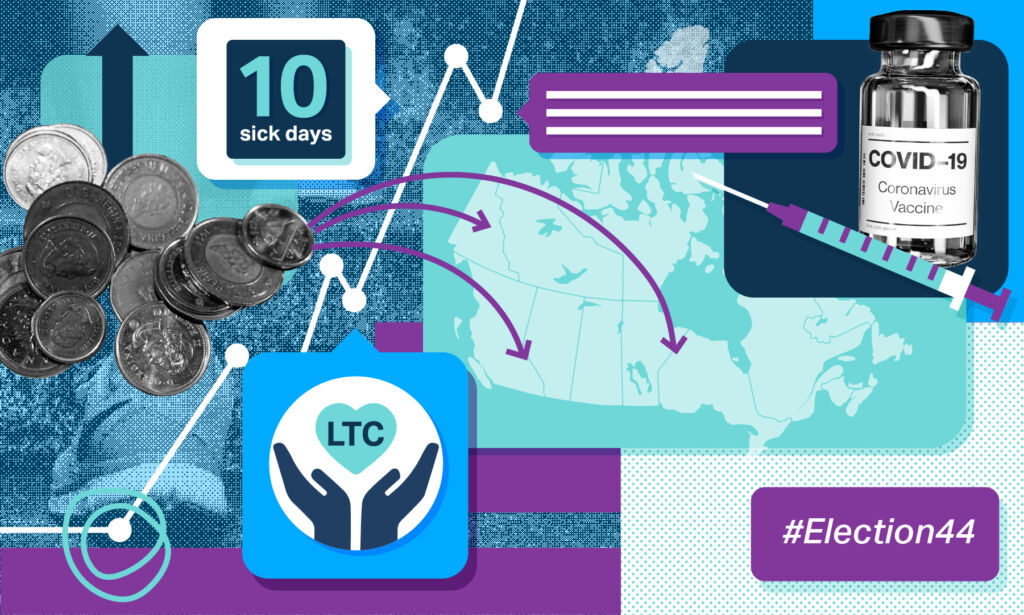With the COVID-19 delta variant raging in the background of this summer’s federal election, all political parties are highlighting how they would prepare Canada for a future health threat.
There are promises of larger federal transfers to the provinces and territories to support health care and the expansion of services for mental health and addictions (Conservatives, NDP, Liberals), pharmacare (NDP), dental care (NDP), and palliative care (Liberals, Conservatives, NDP).
There are pledges to address the glaring flaws in our public health infrastructure evident this past year, including domestic access to vaccines and personal protective equipment. The Liberal Party and the NDP are promising to legislate 10 paid sick days in the Canada Labour Code for federally regulated workplaces. They’re all critical investments.
Where they differ is with respect to their philosophies about how best to spend and target public funding—notably annual health care transfers currently worth $43 billion a year—and the role of for-profit service providers in our system.
Competing proposals to boost health care funding
Decades of underfunding and privatization have taken their toll and population aging is creating greater demand on Canada’s health care system. Federal health transfers have not kept pace.
The Conservative Party is proposing a larger funding envelope for health, boosting the annual growth rate of the Canada Health Transfer (CHT) to at least 6% and dedicating a portion of these funds to mental health. This would result in an increase of $4.3 billion in health transfers by 2025-26 and an additional $13 billion per year by 2030-31. All transfers would be delivered with no strings attached, which puts into question how the proposed expansion of mental health services will come to pass.
Likewise, the Liberal Party is also pledging to boost health care transfers to the provinces, but through conditional transfers: $6 billion to reduce health system wait times in 2021-22 (on top of the $4 billion promised in Budget 2021), another $3.2 billion over four years for the hiring of 7,500 new family doctors, nurses and nurse practitioners, and $400 million over four years for virtual health care services. $4.5 billion over five years is being targeted to mental health services, plus an additional $500 million for student services and $1.4 billion to co-develop an Indigenous mental health strategy.
The NDP is the only party promising to expand the scope of the public health care system in Canada by investing $11.5 billion annually by 2025-26 in a new universal pharmacare program and creating a new national dental care program that would immediately extend coverage to the one in three Canadians who do not have access to private dental insurance.
Millions now struggle to pay for prescriptions and dental care every year—problems that are most acute among women, Indigenous Peoples, racialized people and young adults. The current government has committed to create a national pharmacare program and started the process by creating a Canadian Drug Agency to oversee development, but with no firm timeline. The NDP promises to expedite this process with significant new investments in these programs and the CHT.
Long-term care reform can’t wait
A firm commitment to public delivery also sets apart the NDP’s proposals on long-term care. The party pledges to end for-profit long-term care and bring all existing homes “under the public umbrella,” including the federally owned Revera chain. If elected, the party will work with stakeholders on a set of national care standards for home care and long-term care and provide the resourcing needed to enforce them, including better wages, working conditions, and health and safety protections for workers.
The Liberal Party is also promising to bring in a new set of national standards and federal legislation “to ensure that seniors are guaranteed the care they deserve,” to spend $9 billion over five years to expand the number and quality of long-term care beds, to train up to 50,000 new personal support workers, and to boost wages among these workers to at least $25 per hour. The explicit focus on care workers, who are predominantly female and racialized, is critical to improving conditions of work, which are fundamental to improving conditions of care.
On this key file, the Conservative Party is proposing $3 billion in infrastructure funding over the next three years to help renovate existing facilities and to bring in a new Canada Seniors Care Benefit, committing to pay $200 a month per household to any person living with and caring for a parent over the age of 70. The Liberal Party is taking a different tack, proposing to convert the Canada Caregiving Credit into a refundable tax-free benefit. This proposal will target a much larger group of caregivers.
Every senior and person with a disability has the right to access the care they need to live with dignity. Both paid and unpaid caregivers deserve more respect and support. Yet, these proposals fall considerably short of what’s needed to transform a system that was already struggling before COVID-19 hit.
The Liberal or Conservative platforms don't address the issue of for-profit delivery, which has exacted an enormous toll in long term-care homes during the pandemic. Indeed, the Conservative Party has stated its support for public health care but encourages the expansion of private health services as the provinces see fit.
Decades of research here in Canada and abroad demonstrates the damaging impacts of privatization within health care and other essential services—as measured by higher costs, long wait times for essential services, and the loss of crucial resources and health care workers to the private system. Privatization also works to exacerbate existing health inequities as the affluent jump to the front of the line for care and resources.
What the parties aren’t talking about but should be
The funding announcements capture the headlines but there are critical issues that demand a more fulsome airing and discussion in this election.
Racism: Systemic discrimination and abuse in the health care system contributes to wide health disparities and poorer quality of life. The death of Joyce Echaquan, an Atikamekw woman who died in hospital last year after suffering racist abuse, highlighted the profound barriers that Indigenous Peoples experience in accessing care and support. The federal government held two days of meetings about developing Indigenous health care legislation last September. Both the Liberals and NDP flag this challenge in their platforms. How will each of the parties combat racism in health care moving forward?
Ableism: The discrimination and abuse that people with disabilities experience hasn’t received much attention in this election but it should. People with disabilities remain hugely isolated and exposed. During the pandemic, they have endured months of cancellations and delays in access to care and treatment, unable to rely on the support of family, friends and community services. Across the country, people with disabilities are still subject to medical triage protocols that threaten their very right to health care and life itself. People with disabilities are still waiting for a fulsome discussion of the issues that are shaping their lives in this election.
Gender-affirming care: The 2SLGBTQQIA+ community watched on the sidelines as Bill C-6, which would have banned conversion therapy, effectively died on the order paper as the senate rose this summer. The Liberal Party is promising to re-introduce the legislation, while the NDP would legislate a ban and work with the provinces to make sure that there is equal access to gender-confirming surgery across the country and that these procedures and medications are covered by public health plans.
Conclusion
Health care is rightly taking center stage during this pandemic election and much is at stake. There appears to be consensus across parties that more investments in health care will be needed in the coming years. But without conditions attached to provincial/territorial transfers and without greater investment in the public health care system, Canada may find itself ignoring the lessons learned by the COVID-19 pandemic. And many key aspects to ensuring the health and well-being of Canadians aren’t being debated in this election. COVID-19 may be putting health care on trial, but a lot of important issues are getting crowded out in the process.







